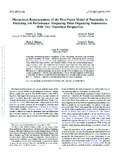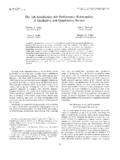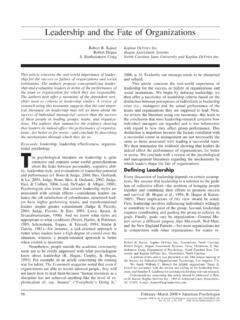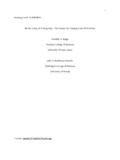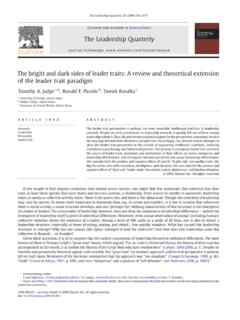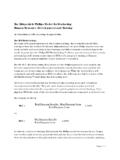Transcription of Intelligence and Leadership: A Quantitative Review and ...
1 RESEARCH REPORTSI ntelligence and Leadership: A Quantitative Review and Test of Theoretical PropositionsTimothy A. JudgeUniversity of FloridaAmy E. ColbertUniversity of IowaRemus IliesUniversity of FloridaMeta-analysis was used to aggregate results from studies examining the relationship between intelligenceand leadership . One hundred fifty-one independent samples in 96 sources met the criteria for inclusionin the meta-analysis. Results indicated that the corrected correlation between Intelligence and leadershipis .21 (uncorrected for range restriction) and .27 (corrected for range restriction). Perceptual measures ofintelligence showed stronger correlations with leadership than did paper-and-pencil measures of intelli-gence. Intelligence correlated equally well with objective and perceptual measures of , the leader s stress level and the leader s directiveness moderated the Intelligence leadership relationship.
2 Overall, results suggest that the relationship between Intelligence and leadershipis considerably lower than previously thought. The results also provide meta-analytic support for bothimplicit leadership theory and cognitive resource characteristics are more valued, or valuable, in modernWestern society than Intelligence . As Herrnstein and Murray s(1994) comprehensive analysis revealed, in addition to its link tojob performance, Intelligence is associated with many social ad-vantages, including employment, economic self-sufficiency, afflu-ence, educational achievement, marital stability, legitimacy, andlawful behavior. Schmidt and Hunter (2000) went so far as toproclaim, Intelligence is the most important trait or construct inall of psychology, and the most successful trait in applied psy-chology (p.)
3 4). The value that society places on Intelligence is nomore evident than in people s views of the traits and skills ofleaders. In a Gallup Poll before the 2000 presidential election, 90%of Americans responded that understanding complex issues wasextremely or very important in determining for which candidatethey would vote. Lord, Foti, and De Vader (1984) found that of 59characteristics such as honesty, charisma, and kindness, intelli-gence was the most prototypical of a leader. Indeed, Lord et that Intelligence was the only attribute that is seen as acritical feature that must be possessed by all of the literature on the traits of effective leaders havereinforced the importance of Intelligence to leadership ( , House& Aditya, 1997).
4 Intelligence has emerged as an important char-acteristic of leaders in most qualitative reviews of the literature(Bass, 1990; Kirkpatrick & Locke, 1991; Mann, 1959; Stogdill,1948). Other reviewers of this literature, though, have been moreequivocal. For example, Fielder (2002) concluded, Intellectualabilities .. do not predict leadership performance to any appre-ciable degree (p. 92).To more accurately determine the relationship between traitsand leadership , Lord, De Vader, and Alliger (1986) used meta-analysis to aggregate the results of studies on the trait theory ofleadership. In conducting their meta-analysis, Lord et al. confinedtheir study to the traits included in Mann s (1959) Review : intelli-gence, masculinity femininity, adjustment, dominance, extrover-sion introversion, and conservatism.
5 Of the traits investigated, Intelligence had the strongest correlation with leadership (rc .50). Although based on a relatively small number of correlations(k 18), this correlation was distinguishable from zero. Further,the majority of the variance in the results across studies was foundto be due to methodological artifacts. In interpreting their results,Lord et al. concluded, Intelligence is a key characteristic inpredicting leadership perceptions (p. 407).Despite this support, there are important areas for further de-velopment. Most fundamentally, past qualitative reviews and theLord et al. (1986) meta-analysis did not directly test whetherintelligence is associated with objective effectiveness. As noted byRubin, Bartels, and Bommer (2002), one cannot assume that theTimothy A.
6 Judge and Remus Ilies, Department of Management, War-rington College of Business, University of Florida; Amy E. Colbert, TippieCollege of Business, University of Ilies is now at the Department of Management, Eli BroadGraduate School of Management, Michigan State concerning this article should be addressed to TimothyA. Judge, Department of Management, Warrington College of Business,University of Florida, 211D Stuzin Hall, Box 117165, Gainesville, FL32611-7165. E-mail: of Applied PsychologyCopyright 2004 by the American Psychological Association2004, Vol. 89, No. 3, 542 5520021-9010/04/$ DOI: of Intelligence on perceptions of leader emergence will bethe same as its effect on objective indicators of leadership effec-tiveness.
7 Indeed, Rubin et al. (2002) found that Intelligence wasmore strongly related to perceived intellectual competence of theleader than to leadership emergence. Lord et al. went to greatlengths to distinguish leadership perceptions from objective mea-sures of effective leadership , and moreover, they cautioned thattheir results generalized to leadership perceptions only. They notedthat their results pertain to leadership perceptions, not to leader-ship effectiveness or to group performance (Lord et al., 1986, ). In addition, Lord et al. called for more research linkingintelligence and other traits to objective measures of , the purpose of this study was to provide a quan-titative Review of the Intelligence leadership literature that (a)distinguishes between different measures of leadership outcomes,including perceptual measures of leader emergence and effective-ness and objective measures of leadership effectiveness; (b) dis-tinguishes perceptual from paper-and-pencil measures of intelli-gence.
8 And (c) tests propositions from two relevant leadershiptheories: implicit leadership theory and cognitive resource the next section of this article, we discuss theoretical expecta-tions regarding the relationship between Intelligence Support for Link Between Intelligence andLeadershipGeneral Intelligence leadership RelationshipFrom a theoretical viewpoint, there are many reasons to believethat Intelligence is related to leadership . On the basis of a com-prehensive Review , Schmidt and Hunter (1998) reported that intel-ligence is one of the best predictors of general job performance,with an overall validity of .51. The Intelligence performance re-lationship is stronger for complex jobs (Schmidt & Hunter, 1998),supporting the importance of Intelligence for leadership becausethe tasks performed by leaders are generally complex.
9 Locke(1991) argued that cognitive ability is an asset to leaders becauseleaders must gather, integrate, and interpret enormous amounts ofinformation (p. 46). Furthermore, leaders are responsible for suchtasks as developing strategies, solving problems, motivating em-ployees, and monitoring the environment. As Fiedler and Garcia(1987) noted, These are intellectual functions, and many aresimilar or identical to those we find on typical Intelligence tests (p. 43).Creativity is another mechanism linking Intelligence to leader-ship (Jung, 2001). Not only may leaders generate creative solu-tions of their own, but they may stimulate follower creativitythrough follower intrinsic motivation and higher quality leader member exchange (Tierney, Farmer, & Graen, 1999).
10 Researchershave long analyzed the relationship between creativity and intel-ligence (Guilford, 1950) and have concluded that the two aredistinct but related constructs (Rushton, 1990). Thus, not only areintelligent leaders better problem solvers, but they are likely to bemore creative and foster the creativity of their , beyond the actual leadership advantages intelligenceaffords, Intelligence also may cause a leader to appear as leader-like. If individuals believe that leaders are endowed with certaincharacteristics, then when individuals observe these characteristicsin others, they infer leadership or leadership potential to exist. AsRubin et al. (2002) noted, Individuals seem to share a commonunderstanding about the traits that leaders possess and these traitsare used as benchmarks for deciding emergent leadership ( ).
